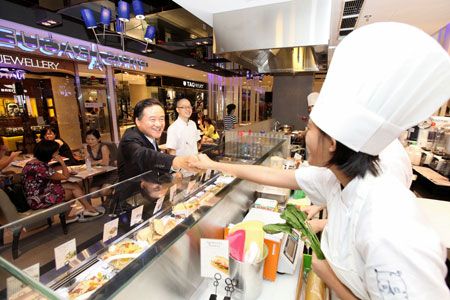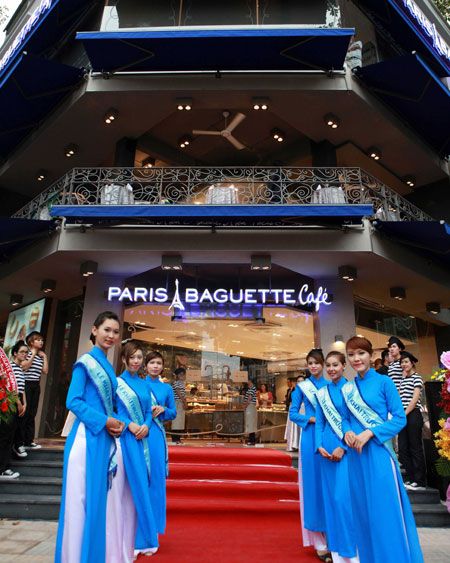Paris Baguette going global

SPC Group Chairman Hur Young-in, left, shakes hands with an employee at a Paris Baguette store in Singapore in September. / Courtesy of SPC
SPC aims to increase bakery outlets to 3,000 in 60 countries by 2020
Bread is a staple food for Westerners and few doubt that the best-quality breads are baked in their countries. For Korean food and confectionery conglomerate SPC Group this is an image it hopes to shatter.
The company’s Paris Baguette and Paris Croissant bakeries are quickly flexing their muscles to export bread baked with self-developed recipes to countries like France, Germany, Italy and Britain where renowned bakeries are located.
The firm already has a presence in the United States, China, Vietnam and Singapore and will enter India and Middle East nations next year.
“We are working toward the ultimate goal of becoming a kingpin in the bakery business in Paris, believed to be the birthplace of bread,” SPC spokesman Park Kyung-bae said.
SPC is the undisputed leader in Korea’s bakery industry with 3,190 outlets here and another 131 overseas. The group, established in 1945 as Sammidang, owns other food-related affiliates such as bread maker Samlip, Dunkin Donuts and Baskin-Robbins among others.

SPC employees celebrate the opening of a Paris Baguette store in Ho Chi Minh City, Vietnam, in March. / Courtesy of SPC
Amid domestic market saturation, SPC opened a flagship Paris Baguette store in Shanghai, China, in September 2004 in search of a new growth engine. It currently has 103 Paris Baguettes in China, home to 1.2 billion people.
“Having more than 100 stores in China means SPC has firmly established its brand and customer base there,” an SPC official said.
It is preparing for a full-fledged entry into southern and western parts of China with the goal of 500 stores there by 2015. It tapped into the U.S. market in October 2005 by opening a flagship store in Los Angeles’ Koreatown. Currently there are 24 stores in Los Angeles and New York. There are also three Paris Baguette shops in Vietnam and one in Singapore.
Marking the opening of 100th overseas store last March, SPC unveiled its ambitious goal for the overseas market of having 3,000 Paris Baguettes in 60 countries by 2020 with combined sales of over 2 trillion won ($1.84 billion).
The firm cited “taste” and “localized sales and marketing schemes” as core recipes for its success.
“We have approached overseas markets with bread baked in a way that meets the taste of our target customers,” a company official said. “We will employ new strategies to reach our new goal.”
The official said SPC will make headway toward its new goal with a diversified product lineup, a premium strategy targeting high-end customers and more localized marketing and sales activities.
In the early stages of entering overseas markets, the firm will do business based on premium marketing, focusing on high-end consumers that will help people recognize Paris Baguette as a premium brand. This will be backed by a variety of promotional campaigns designed to highlight SPC’s supremacy in terms of quality of products and services as well as brand value.
“SPC will become the world’s biggest bakery company with more than 3,000 stores around the world by 2020,” the official said. “We have grown as Korea’s No. 1 bakery brand with strategies focusing on brand and product quality. We will reach our new goal with strategies that will embrace people with diverse tastes around the world.”
SPC is paying increasing attention to Southeast Asian countries due to their huge growth potential. It said the area will play a pivotal role in its pan-Asia expansion.
The role of the Singaporean store is particularly important because the city state is an ideal test for expansion into neighboring countries, including southern China, Cambodia, the Philippines and Indonesia.
The SPC spokesman said the Singapore store posts 12-13 million won in daily sales, nearly six times higher that of the average of the 3,000 stores in Korea.
“Singapore is a melting pot in Asia,” said Daewoo Securities senior analyst Baek Woon-mook, referring to a socio-cultural term coined by U.S. President Woodrow Wilson to describe diversity within the United States in terms of culture, race, state of origin and other backgrounds in one community. “Though Singapore is small, the country is a mixture of starkly different lifestyles and eating habits among others, which means a successful performer in the Singapore market is proven to appeal to customers in many other Asian countries,” Baek added.
“We are engaging in fierce competition with international bakery brands there,” Park said, pointing to Singapore-based Bread Talk and Deli France, French firm Paul and Maison Kayser and American brand Dean & Deluca.
“We are approaching the market with a premium strategy targeting high-end customers. If we survive and keep flourishing in Singapore, this indicates we have proven ability to make money in such emerging markets as China and the Middle East.” <The Korea Times/Park Si-soo>

























































